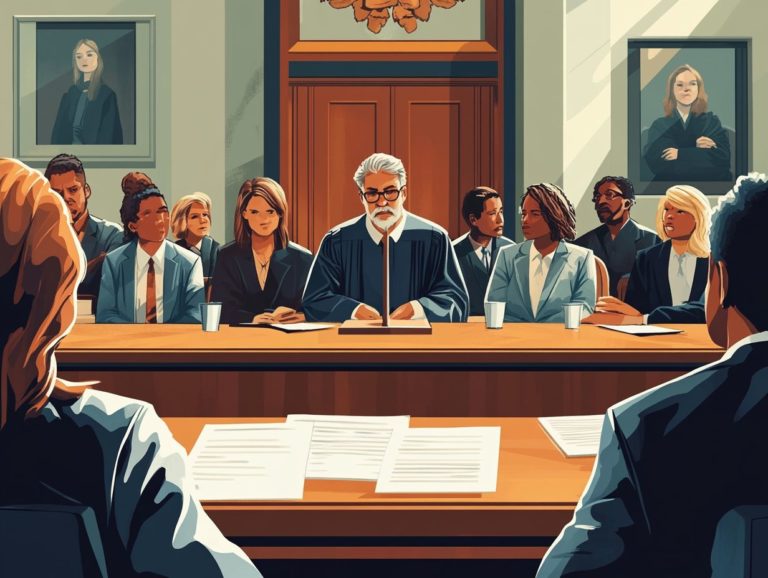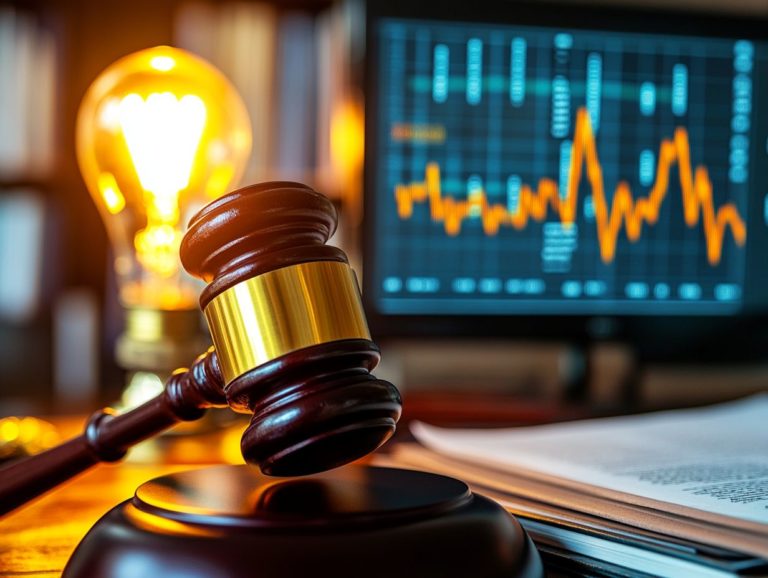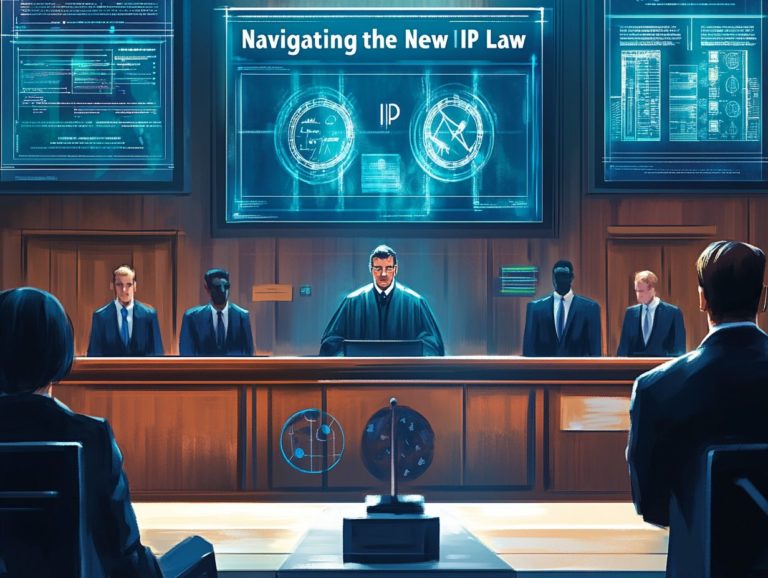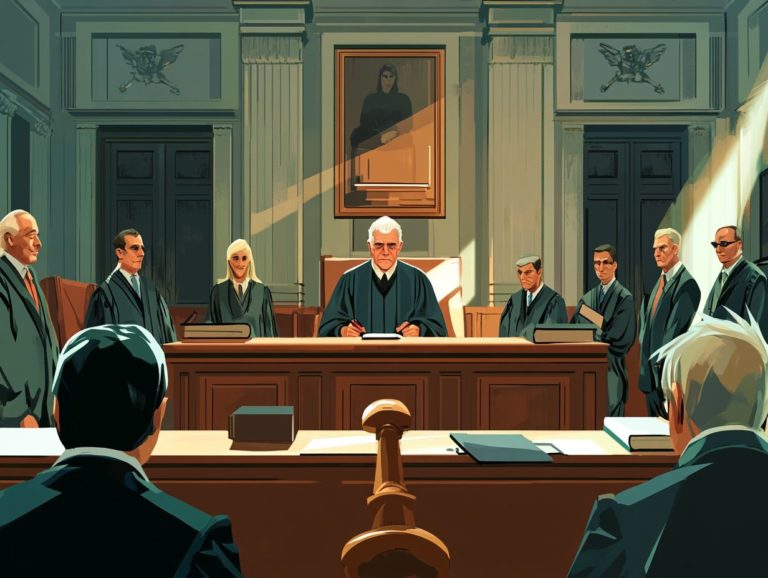The Global Landscape of IP Litigation Today
In an increasingly interconnected world, intellectual property (IP) litigation has become a vital arena for innovation and business.
Understanding the fundamentals, trends, and significant cases in IP litigation is essential for anyone navigating today s complex legal landscape.
This article explores key aspects of IP litigation on a global scale, examining the driving forces behind these disputes and the challenges faced by legal professionals.
Join us as we explore impactful cases and consider the future trajectory of this dynamic field.
Contents
- Key Takeaways:
- Understanding IP Litigation Basics
- IP Litigation Trends Around the World
- Notable IP Litigation Cases
- Factors Driving IP Litigation
- Challenges in IP Litigation
- Introduction
- Future of IP Litigation
- Frequently Asked Questions
- 1. What is the current state of IP litigation on a global scale?
- 2. What are the most common types of IP disputes that occur globally?
- 3. How do different countries handle IP disputes?
- 4. What are some challenges faced in global IP litigation?
- 5. How can companies protect themselves against IP litigation on a global scale?
- 6. Can alternative dispute resolution methods be used in global IP litigation?
Key Takeaways:

- IP litigation protects ownership rights of ideas and inventions globally, serving as a crucial tool for creators and innovators.
- The global landscape of IP litigation is constantly evolving, with rising trends in patent, copyright, and trademark cases, underscoring the importance of IP protection in today’s competitive market.
- Technological advancements and globalization drive the increase of IP litigation cases, while legal and ethical considerations pose significant challenges.
Understanding IP Litigation Basics
IP litigation is a specialized realm of law designed to enforce and protect your ownership rights be it patents, trademarks, or copyrights.
The primary aim is to resolve disputes arising from unauthorized use, infringement, or misappropriation of these valuable assets, which can significantly impact your business s competitive position.
As technology evolves, the legal landscape surrounding IP litigation continually shifts. It is essential to stay updated on the latest developments, especially concerning e-commerce and digital integration.
Definition and Purpose
IP litigation is the legal path you take when faced with a dispute over ownership rights of ideas and inventions, including patents, trademarks, and copyrights. This process allows you to enforce your rights, ensuring that your innovative ideas and brand identity remain protected.
Addressing potential infringements swiftly helps safeguard your competitive edge. Neglecting these disputes can lead to costly legal battles and significant financial damages that could cripple your business.
Unresolved IP conflicts can tarnish your company s reputation and stifle growth. Therefore, engaging in IP litigation when necessary becomes a strategy and a necessity for any serious entity.
IP Litigation Trends Around the World
It’s clear that significant trends are shaping IP litigation today, driven by technological advancements, shifts in patent law, and diverse enforcement practices across jurisdictions, including the impact of digital transformation on IP litigation.
The explosive growth of e-commerce, along with innovative technologies such as AI, Blockchain, and 3D printing, has spurred a surge in patent applications as companies strive to protect their intellectual property assets.
However, market uncertainty and the rise of patent trolls entities that enforce patent rights against alleged infringers without producing products have made it increasingly complex for businesses to navigate this legal terrain.
Key Statistics and Patterns
Key statistics and patterns in IP litigation provide insights into the frequency and outcomes of patent disputes, shedding light on the ongoing challenges businesses face in the intricate legal landscape, including the role of technology in modern IP litigation.
An analysis of recent data reveals that the number of IP cases filed annually has surged significantly, indicating growing competition among companies eager to protect their innovations. The average win rates for plaintiffs hover around 60%, suggesting a relatively favorable environment for those willing to pursue litigation.
The average damages awarded have skyrocketed, often reaching into the multimillion-dollar range, highlighting the substantial financial stakes at play. Emerging trends also indicate an increase in strategic settlements, as companies carefully evaluate the costs of extended litigation against potential losses.
This shift in enforcement tactics may reshape the future of intellectual property rights.
Notable IP Litigation Cases

Notable IP litigation cases have significantly influenced patent law and enforcement strategies. They often establish precedents that reverberate through future disputes and legal frameworks.
The high-profile cases involving major technology giants like Apple and Samsung underscore fierce competition within the tech sector. They also highlight the intricate challenges of enforcement in patent litigation.
These cases illuminate the legal ramifications of patent rights and shed light on the relentless struggle against counterfeit products. This highlights the critical need for robust risk management strategies.
Impactful Cases and Their Outcomes
Impactful cases in IP litigation can lead to significant outcomes that shape the future of patent disputes. They influence the legal landscape for your business.
These landmark decisions set legal precedents and force companies to navigate an increasingly complex environment. The stakes are high, and the risks of infringement come with severe financial consequences.
Consider a ruling that redefines what constitutes previous inventions or ideas affecting your patent rights. Such a decision could compel you to revisit your patent portfolio and identify vulnerabilities you might not have previously considered.
By analyzing specific cases, you ll see how legal outcomes spur changes in enforcement strategies. This prompts you to adopt more robust measures to protect your intellectual property.
This heightened vigilance may also influence your strategic partnerships and venture decisions. You will need to weigh the potential for costly litigation against the benefits of innovation and collaboration.
Factors Driving IP Litigation
Several factors are propelling the surge in IP litigation. Technological advancements and globalization are redefining the landscape in which businesses operate and compete today, especially considering the role of the internet in IP litigation.
The rapid emergence of groundbreaking technologies like AI and Blockchain has resulted in a flood of patent applications. This compels companies to reevaluate their IP strategies and compliance frameworks.
The digital marketplace is expanding, leading to mounting challenges related to patent trolls and the intricate issues surrounding enforcement.
Technological Advancements and Globalization
Technological advancements and globalization have transformed the world of IP litigation, particularly noted in the rise of online IP litigation cases. These changes have led to an increase in patent applications and a rethinking of enforcement strategies.
Innovations like AI streamline the patent examination process, while Blockchain ensures traceability and authenticity. The complexities surrounding ownership and infringement are continually evolving.
3D printing makes it incredibly easy to copy patented designs. This creates new enforcement challenges that demand immediate attention.
As you navigate the global digital marketplace, grappling with various legal jurisdictions presents monumental challenges. This prompts a reevaluation of strategies for patent protection and enforcement.
Organizations must act now to stay ahead of emerging technologies to effectively safeguard their innovations.
Challenges in IP Litigation
In the realm of IP litigation, you will encounter legal and ethical challenges that demand keen attention and skillful navigation. This is essential to safeguard your clients’ interests effectively.
These hurdles frequently stem from the intricate nature of patent law and rigorous compliance requirements. The potential for significant business interruptions as disputes unfold cannot be ignored.
As the legal landscape continues to evolve, the ethical ramifications of aggressive litigation tactics particularly those utilized by patent trolls are increasingly subject to scrutiny. You need to tread carefully in your approach.
Introduction
Understanding legal and ethical considerations in IP litigation is essential for ensuring fairness and integrity in the enforcement of IP rights. This is especially true when navigating the murky waters of patent trolls and non-practicing entities (NPEs), which are companies that own patents but don t produce products.
Legal and Ethical Considerations
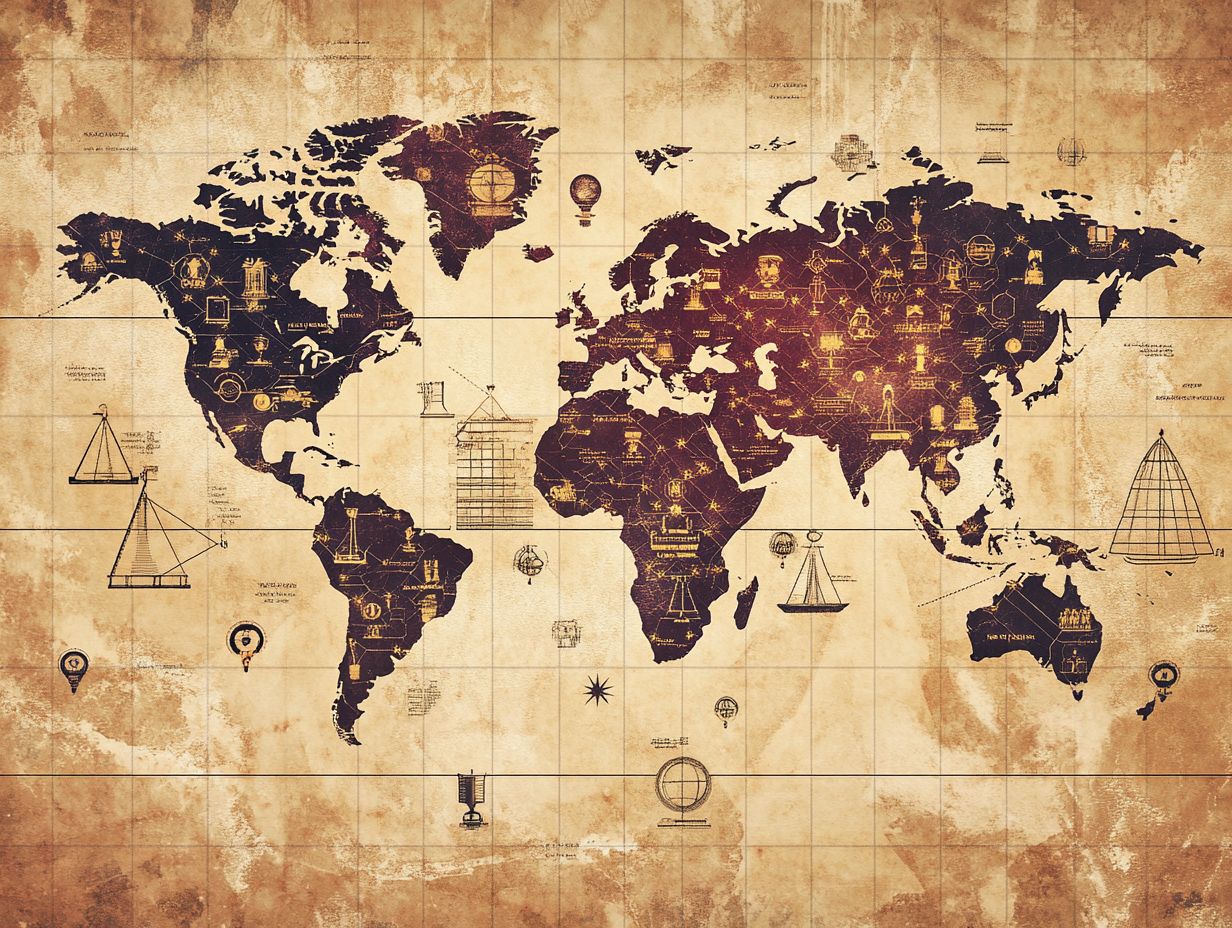
These considerations are the cornerstone of IP disputes, playing a pivotal role in maintaining trust within the legal system. As you engage in legal battles, it s crucial to adhere to established guidelines; failing to do so can result in serious consequences.
For example, unethical practices don t just threaten the validity of your claims they also erode public confidence in patent protection. The aggressive litigation strategies employed by certain entities can stifle innovation and competition. You should maintain a delicate balance between legal maneuvering and ethical responsibility in these complex scenarios.
Future of IP Litigation
The future of IP litigation is on the brink of transformative changes, driven by regulatory advancements and technological innovations, including the role of international law in IP litigation, reshaping the legal landscape.
As you navigate the challenges brought forth by emerging technologies such as AI and Blockchain, you may witness shifts in the enforcement and litigation of patent rights, both domestically and internationally.
Stay ahead of the game by keeping informed about these trends. This will enable you to adeptly maneuver through the increasingly intricate realm of IP disputes. Don’t get left behind in the fast-evolving world of IP litigation!
Predictions and Potential Changes
Predictions about the future of IP litigation indicate that you may soon find yourself navigating a more intricate landscape shaped by regulatory changes and evolving legal frameworks.
As policymakers refine intellectual property laws, it s crucial for your business to stay vigilant. You should adjust your strategies to effectively navigate these shifting terrains.
The rise of international agreements might promise more unified enforcement practices; however, discrepancies across jurisdictions could present significant compliance challenges for global operations.
As such, you should adopt strong rules and guidelines that not only align with emerging regulations but also anticipate future changes. This proactive and adaptive approach will be essential for mitigating litigation risks and maintaining a competitive edge in your market.
Frequently Asked Questions
Here are some common questions about IP litigation.
1. What is the current state of IP litigation on a global scale?
The global landscape of IP litigation today is complex and constantly evolving. With the rise of technology and globalization’s impact on IP litigation, the number of IP disputes has significantly increased in recent years.
2. What are the most common types of IP disputes that occur globally?
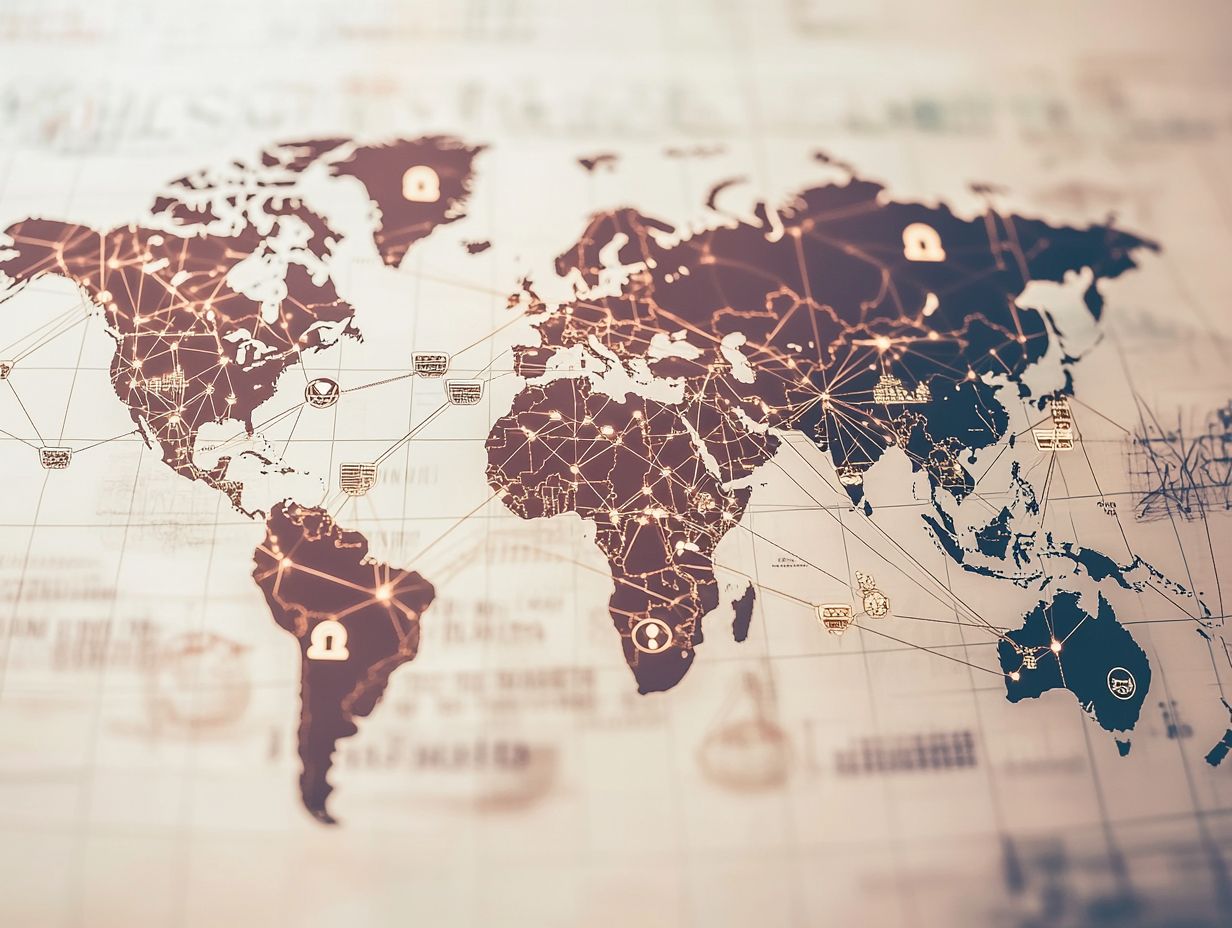
The most common types of IP disputes that occur globally include patent infringement, copyright infringement, trademark infringement, trade secret misappropriation, and unfair competition. These disputes can arise in various industries and can involve both domestic and international parties.
3. How do different countries handle IP disputes?
Different countries have different legal systems and regulations for handling IP disputes. Some have specialized IP courts, while others may have a separate division within their court system. It is important to understand the local laws and procedures for IP disputes in each country.
4. What are some challenges faced in global IP litigation?
Challenges faced in global IP litigation include navigating different legal systems, language barriers, cultural differences, and varying levels of IP protection. Understanding the historical development of IP litigation laws can help clarify how these factors complicate the enforcement of IP rights and lead to complex and lengthy litigation processes.
5. How can companies protect themselves against IP litigation on a global scale?
To protect against IP litigation, companies should conduct thorough research and due diligence before entering into any business agreements or partnerships. They should also ensure that their IP rights are properly registered and protected in all relevant jurisdictions.
Ready to navigate IP disputes? Contact us for expert guidance!
6. Can alternative dispute resolution methods be used in global IP litigation?
Yes! Alternative dispute resolution methods like mediation and arbitration can be used in global IP litigation. They offer a quicker and cheaper alternative to traditional lawsuits.
Plus, these methods help keep matters confidential and can preserve vital business relationships. Isn t that an appealing option?

